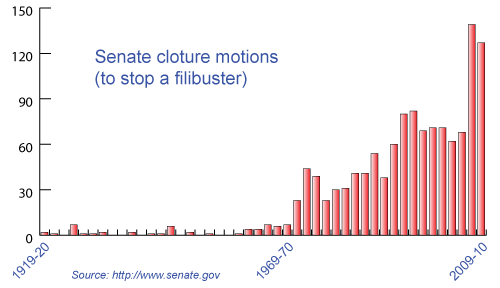What do enhancements to food safety, paycheck equity and small business lending have in common? Hard as it is to believe, they've been targeted by the Republican filibuster. If the GOP had its way, the country would have nothing to show for the first two years of the Obama presidency.
During that time Republicans in Congress have been willing to filibuster pretty much anything, making what used to be a last resort their first resort. In the process, they have created a radically new form of governance: the legislative process is now routinely controlled by less than 8 percent of Congress.
What? How could that be? Like this:
- The Senate is the gate through which all legislation must pass
- That gate can be blocked by just 41 out of 100 senators, if they threaten a filibuster
- Those 41 senators are only 8 percent of the total membership of Congress: 100 senators plus 435 representatives.
This has always been possible, but it's never happened before.
In the entire 19th Century, the filibuster was invoked fewer than two dozen times.
Until 1970, there were never more than 7 cloture motions (to forestall a filibuster) in a two-year term of Congress. Then 1971-72 saw a jump to 23 cloture motions, and between that term and 2005-06 the average was 37.
But in 2007-08, there was a sudden and dramatic leap upward: 139 cloture motions. And in the current Congress there have been 127, so far.
Now Republicans might argue that there are simply a whole lot of things being done under the Obama administration that must be stopped.
But take a look at the Senate's list of all cloture motions for the 111th Congress. Some of the measures for which Republicans threw the emergency brake:
- The Revolutionary War and War of 1812 Battlefield Protection Act
- Department of Homeland Security Appropriations
- More judicial appointments than for any president since Nixon -- many eventually winning approval by wide margins, indicating there was no real problem with them in the first place.
It's hard to find anyone who believes the filibuster was meant to be used this indiscriminately. As Constitutional scholars Martin Gold and Dimple Gupta told Newsweek last year, the contemporary filibuster wasn't part of the founders' original design: "The possibility that a minority of senators could hold unlimited debate on a topic against the majority's will was unknown to the first Senate." But under the current Republican model, you'd think it was sacrosanct -- perhaps one of the more occult aspects of their "strict constructionist" view of the Constitution.
Although former Bush speechwriter Michael Gerson recently professed shock that anyone could even think such a thing, the point of this obstructionism is obvious: to "break" Obama, as Senator Jim DeMint indiscreetly put it. Republicans know they can evade blame because most peoples' eyes glaze over the moment process talk like "filibuster" and "cloture" starts up. But people understand lack of progress -- and the pain it causes -- all too well.
Unfortunately, the only progress the modern Republican Party cares about is its own. And the pain experienced by the rest of the country?
To the 8 percent who rule Congress, that's just a bargaining chip.
